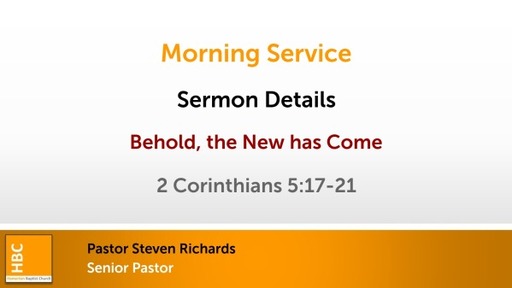Behold, the New Has Come

1. A New Creation v17
a. In Christ
To be in Christ connotes being part of Christ’s body (1 Cor. 12:27), and Christ brings about a radical transformation in the believer’s life. Instead of serving the ego, the Christian follows Christ and responds to the law of love for God and the neighbor.
To be in Christ connotes being part of Christ’s body (1 Cor. 12:27), and Christ brings about a radical transformation in the believer’s life. Instead of serving the ego, the Christian follows Christ and responds to the law of love for God and the neighbor.
b. Old Has Gone
c. New Has Come
2. From God v18-19
a. Through Christ v18
“And all things are from God.” No one can ever say that renewal has its origin in human beings, for Paul clearly teaches that God is the originator and source of renewal. God created all things through Christ Jesus (John 1:3; Col. 1:15–18; Heb. 1:2) and recreates all things for his children. They are in Christ Jesus, for God is the cause of their membership in the body of Christ (refer to 1 Cor. 1:30).
b. Reconciled v18
God took the initiative and completed the work of reconciliation before we, as sinners, began to respond to God’s gracious invitation to be reconciled to him (Rom. 5:10–11). In brief, God restored the relationship between himself and us, so that his new creation for us could be fully realized.
c. Ministry v18-19
God wants his servants to be engaged in a restorative ministry by preaching, teaching, and applying the gospel. For Paul, this is ministry of the Spirit of the living God (3:3, 8), and is glorious in bringing forth righteousness (3:9).
Reconciliation takes place when two parties, estranged from each other, are brought back into a harmonious relationship through the efforts of a mediator. For us, that mediator is Jesus Christ, God’s Son. We readily admit that estrangement from God was our fault, for our sins grieved him and our animosity toward him aroused his anger.
3. Ambassadors for Christ v20
a. Through Us
The word implies that an older person or the eldest person in a group was appointed as a spokesman to represent a king, a ruler, or a community. In Jewish circles, this person was called a šālîaḥ, one who would speak the exact words of his sender. Similarly, today an ambassador represents his government by conveying to the host country messages of either the president or the prime minister who has appointed him. As soon as an ambassador utters his own opinion and speaks contrary to the intent of his government, he is relieved of his post.
b. On Behalf of Christ
Through his servants, God is communicating to the people the message of reconciliation and pleading with them to accept his word in faith. And this appeal goes forth from day to day but especially on the the Lord’s Day, when God’s Word is proclaimed.
4. Motivation v21
a. Made Sin
Now the apostle explains that God took his sinless Son and made him the sinbearer in our place. God had his Son pay the death penalty for our sins, so that we might be set free and declared righteous in his sight. Christ redeemed us by taking upon himself the curse that rested on us (Gal. 3:13).
b. Made Righteous
God grants and credits to me
the perfect satisfaction, righteousness,
and holiness of Christ,
as if I had never sinned nor been a sinner,
as if I had been perfectly obedient
as Christ was obedient for me.
